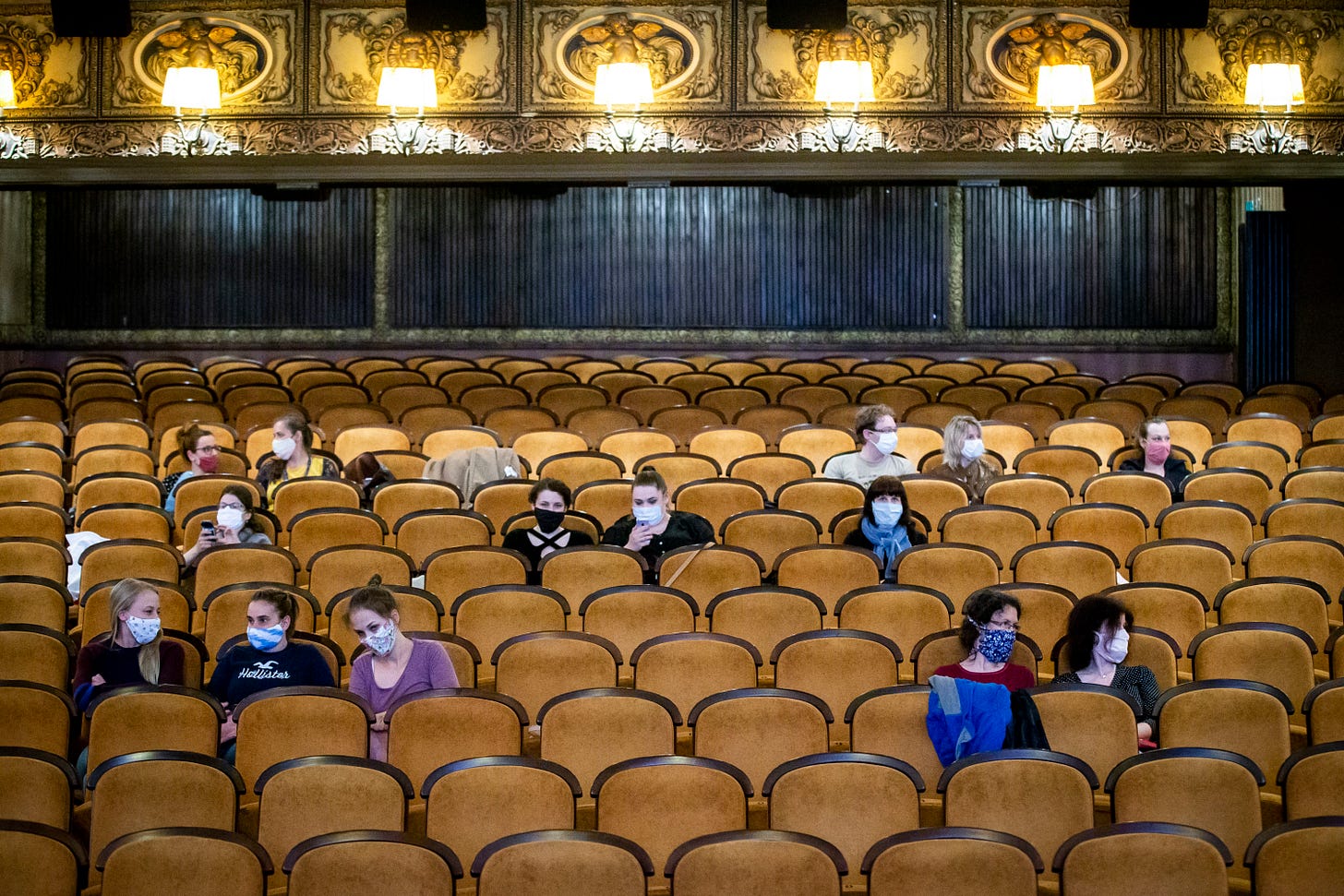Hey. You. Sit Down and Shut Up.
Places where we sit in silence, like theaters, may be safer from COVID than those where we sing, scream, or shout.

Last week, as debate raged among film critics about whether or not they should go see movies in theaters for their job and how vocally they should signal why/why not they were/were not going to theaters, I asked my virus guy if any superspreader events had been tied to movie theaters. I figured there had to be at least one or two in Korea, given the excellence of their contact tracing and the prominence of their theaters.
So: Yes, I have a virus guy. You should have one too; they’re super helpful. For instance, in this case my virus guy said he hadn’t heard of any such events and was kind of surprised that places like New York City continued to have theaters closed despite the city reopening other venues, like gyms. As Dr. Robert Lahita, chairman of medicine at St. Joseph’s Health in New Jersey, told Vulture last week, that doesn’t make a ton of sense.
“If you’re going to do phase four opening of essentially nonessential locales such as restaurants, gyms, tattoo parlors, and barbershops, I would think those would be of more risk than going to a movie theater, because of their inherent proximity to strangers,” Lahita said. Even eating in a theater was less dangerous than you might think: “Unless you’re being coughed or sneezed on by the person behind you, or the children next to you, I don’t see any major risk.”
One reason movie theaters might not be an enormous risk—especially if most patrons are wearing masks and you get six-plus-feet of space between everyone—is that, at least in theory, movie-watching is a silent activity. You go to the movies; you sit there and munch some popcorn; and you watch what’s happening on the screen. If you’re a civilized person, you’re neither hollering advice to the projections nor are you turning to patrons and asking their opinion of the action on the screen. And, as an interesting new piece for the Atlantic shows, the less we talk—and the more quietly we talk—the less we spread COVID-19.
“Talking less, more quietly, or not at all limits the manufacture of both large droplets and aerosols. When you breathe or whisper, your respiratory system doesn’t emit large droplets,” writes Derek Thompson. “[Jose L. Jimenez, a professor at the University of Colorado Boulder] told me that, compared with yelling, quiet talking reduces aerosols by a factor of five; being completely silent reduces them by a factor of about 50. That means talking quietly, rather than yelling, reduces the risk of viral transmission by a degree comparable to properly wearing a mask.”
As you see, Thompson has a virus guy too. Well, I’m guessing he has several virus guys. “Sources,” they’re called in legitimate journalism. But Thompson’s virus guy, Professor Jimenez, echoed what my virus guy said. Theaters haven’t been linked to any mass transmissions, as best as he can tell:
“I can’t name a movie-theater outbreak in the contact-tracing literature,” Jimenez said, while also stressing that movie theaters cannot be considered risk-free, given that they are poorly ventilated indoor spaces where people spend several consecutive hours. “I can tell you that theaters don’t seem nearly as dangerous as a loud restaurant or bar, where people have to speak loudly to be heard.”
All of which is to say that if you’re headed to see Tenet this week, you don’t need to feel like you’re taking your life in your hands.
Look, all of this is in flux. We’re all trying to figure our way through this thing, feeling out what’s safe and what isn’t. There’s no point in going to a theater if you’re going to spend the whole time wondering if you’re going to die because someone 20 feet away from you bought a bucket of popcorn and isn’t replacing his mask as quickly as he should. If you have comorbidities or are above a certain age, you might want to stay away out of an abundance of caution. And maybe you want to avoid some of the more notoriously rowdy theaters where people like to shout at the screen or perform their standup routines to the moronic chuckles of those in attendance.
But if you can find a theater where the patrons are expected to follow the rules of common moviegoing decency—particularly places like an Alamo Drafthouse or an Arclight or an Angelika—you’re probably safer in a theater than you are at a restaurant or a gym or surrounded by folks shouting out slogans.


